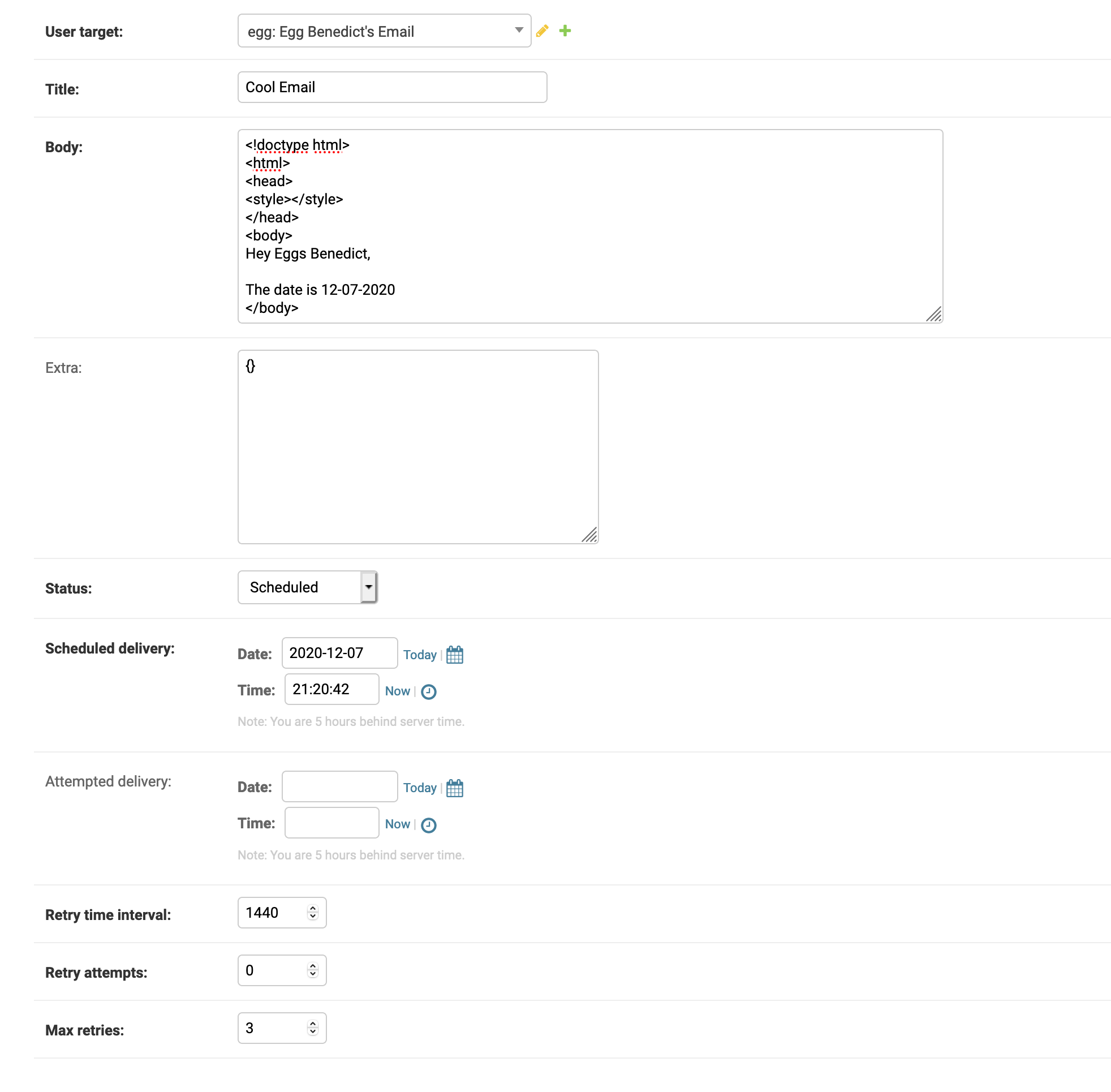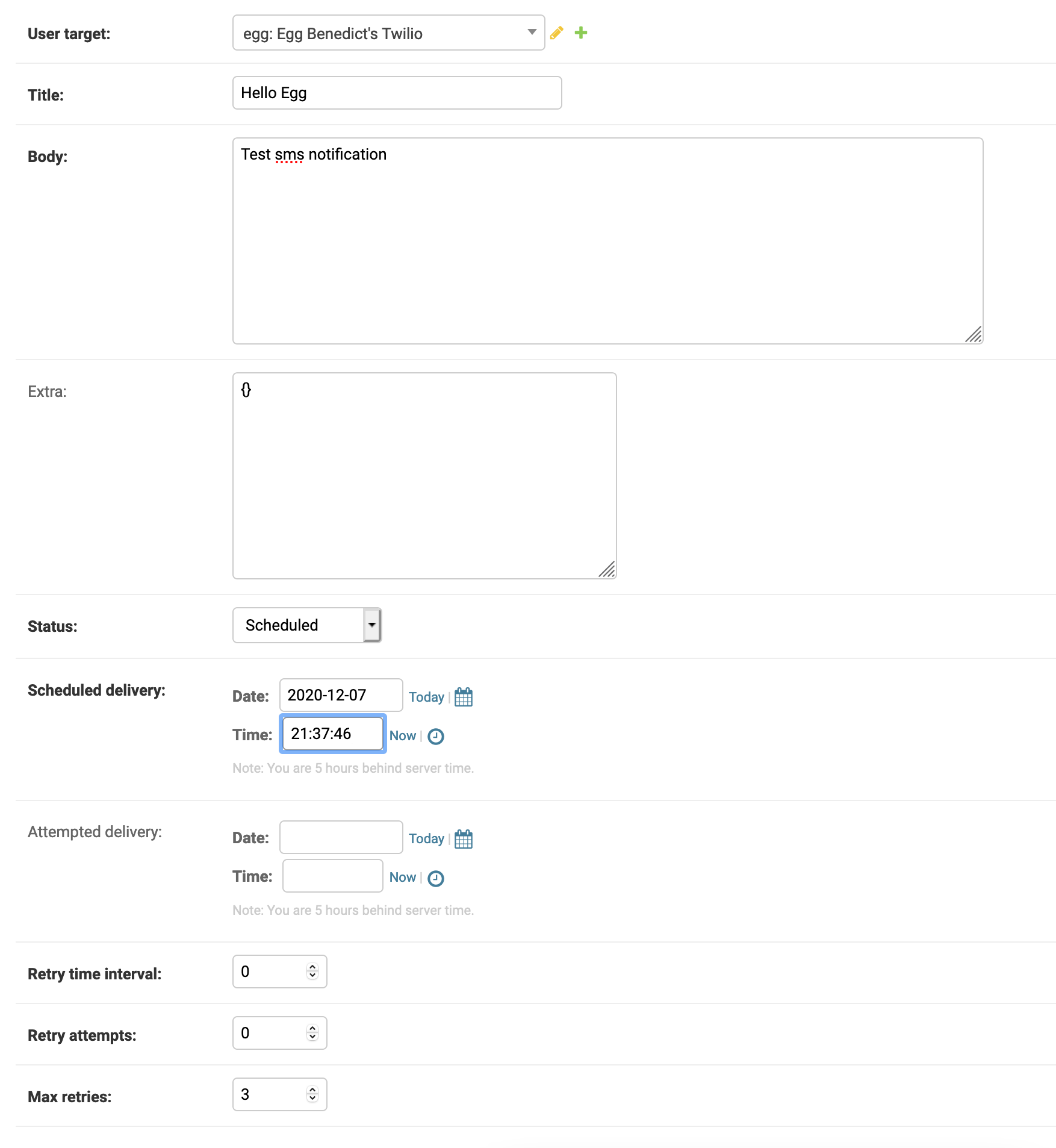Built-In Notification Creators & Handlers¶
What allows for a given notification type to be supported is the existence of a notification creator and notification handler functions. Their jobs are to:
Create a
Notificationrecord for a given notification target.Interpret a
Notificationrecord in an appropriate way for a given target and actually send the notification.
Currently there are 3 different types of notifications with built-in support:
Twilio SMS
Expo Push
Natively Supported Notification Targets¶
Email Notifications¶
NOTE: To send emails, you will need to have the appropriate variables in your settings file. More information can be found here. We also have examples here.
Notification Creator¶
- Example: Email Notification Creator
from django.contrib.auth import get_user_model from django_notification_system.notification_creators.email import create_notification User = get_user_model() user = User.objects.get(first_name="Eggs", last_name="Benedict") # Note how the extra parameter is used here. # See function parameters below for more details. create_notification( user=user, title='Cool Email', extra={ "user": user, "date": "12-07-2020" "template_name": "templates/eggs_email.html" })
- Function Parameters
Key
Type
Description
user
Django User
The user to whom the notification will be sent.
title
str
The title for the notification.
body
str
Body of the email. Defaults to a blank string if not given. Additionally, if this parameter is not specific AND “template_name” is present in extra, an attempt will be made to generate the body from that template.
scheduled_delivery
datetime(optional)
When to delivery the notification. Defaults to immediately.
retry_time_interval
int(optional)
When to retry sending the notification if a delivery failure occurs. Defaults to 1440 seconds.
max_retries
int(optional)
Maximum number of retry attempts. Defaults to 3.
quiet
bool(optional)
Suppress exceptions from being raised. Defaults to False.
extra
dict(optional)
User specified additional data that will be used to populate an HTML template if “template_name” is present inside.
The above example will create a Notification with the following values:
Notification Handler¶
- Example Usage
from django.utils import timezone from django_notification_system.models import Notification from django_notification_system.notification_handlers.email import send_notification # Get all email notifications. notifications_to_send = Notification.objects.filter( target_user_record__target__name='Email', status='SCHEDULED', scheduled_delivery__lte=timezone.now()) # Send each email notification to the handler. for notification in notifications_to_send: send_notification(notification)
Expo Push Notifications¶
Notification Creator¶
- Example: Expo Notification Creator
from django.contrib.auth import get_user_model from django_notification_system.notification_creators.expo import create_notification User = get_user_model() user = User.objects.get(first_name="Eggs", last_name="Benedict") create_notification( user=user, title=f"Hello {user.first_name}", body="Test push notification")
- Parameters
Key
Type
Description
user
Django User
The user to whom the notification will be sent.
title
str
The title for the push notification.
body
str
The body of the push notification.
scheduled_delivery
datetime(optional)
When to delivery the notification. Defaults to immediately.
retry_time_interval
int(optional)
Delay between send attempts. Defaults to 60 seconds.
max_retries
int(optional)
Maximum number of retry attempts. Defaults to 3.
quiet
bool(optional)
Suppress exceptions from being raised. Defaults to False.
extra
dict(optional)
Defaults to None.
The above example will create a Notification with the following values:
Notification Handler¶
- Example Usage
from django.utils import timezone from django_notification_system.models import Notification from django_notification_system.notification_handlers.expo import send_notification # Get all Expo notifications. notifications_to_send = Notification.objects.filter( target_user_record__target__name='Expo', status='SCHEDULED', scheduled_delivery__lte=timezone.now()) # Send each Expo notification to the handler. for notification in notifications_to_send: send_notification(notification)
Twilio SMS¶
NOTE: All Twilio phone numbers must contain a + and the country code. Therefore, all Twilio UserTargetRecords target_user_id should be `+{country_code}7891234567’. The sender number stored in the settings file should also follow this format.
Notification Creator¶
- Example: Twilio SMS Notification Creator
from django.contrib.auth import get_user_model from django_notification_system.notification_creators.twilio import create_notification User = get_user_model() user = User.objects.get(first_name="Eggs", last_name="Benedict") create_notification( user=user, title=f"Hello {user.first_name}", body="Test sms notification")
- Parameters
Key
Type
Description
user
Django User
The user to whom the notification will be sent.
title
str
The title for the sms notification.
body
str
The body of the sms notification.
scheduled_delivery
datetime(optional)
When to deliver the notification. Defaults to immediately.
retry_time_interval
int(optional)
Delay between send attempts. Defaults to 60 seconds.
max_retries
int(optional)
Maximum number of retry attempts. Defaults to 3.
quiet
bool(optional)
Suppress exceptions from being raised. Defaults to False.
extra
dict(optional)
Defaults to None.
The above example will create a Notification with the following values:
Notification Handler¶
- Example Usage
from django.utils import timezone from django_notification_system.models import Notification from django_notification_system.notification_handlers.twilio import send_notification # Get all notifications for Twilio target. notifications_to_send = Notification.objects.filter( target_user_record__target__name='Twilio', status='SCHEDULED', scheduled_delivery__lte=timezone.now()) # Send each notification to the Twilio handler. for notification in notifications_to_send: send_notification(notification)


